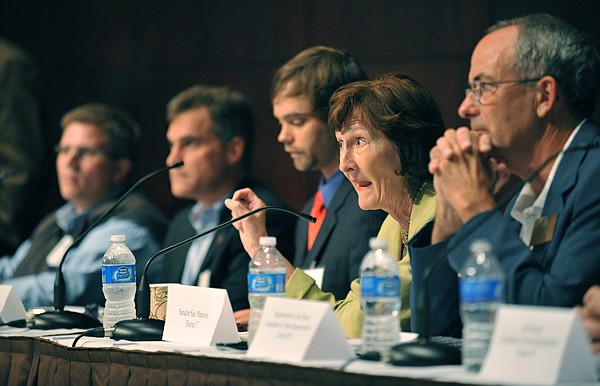Money issues lead at candidate forum
Tuition up, pay stagnant cited at UA
State Sen. Sue Madison, D-Fayetteville, answers a question Thursday at a political candidate forum at the University of Arkansas at Fayetteville. Candidates answered questions from staff members on higher education topics, such as pay freezes for employees and lottery
Friday, October 1, 2010
FAYETTEVILLE — State funding for higher education institutions, stagnant pay at public universities and skyrocketing tuition rates were the top issues raised Thursday during a candidate and legislator forum at the University of Arkansas at Fayetteville.
“What people really care about is their pay,” state Sen. Sue Madison, D-Fayetteville, told about 60 students, staff and faculty at the forum.
Two legislators - Madison and state Rep. Jim House, D-Fayetteville - were joined by four other candidates forNorthwest Arkansas-based seats: Democrat Earl Hunton of Prairie Grove, running for the District 87 seat in the state House; Justin Harris, R-West Fork, who also is seeking the District 87 seat; Republican Charlie Collins, who faces House for the District 89 seat; and Abel Tomlinson, a write-in independent for state House District 92. The six answered questions about lottery scholarships, tuition hikes, pay freezes and low pay for some staff and faculty.
Faculty members said Thursday they worry thestate will cut funding when legislators go into session next year. That worry has been exacerbated by watching other states with lottery-funded scholarships cut funding, said Trish Watkins, the university Staff Senate’s Legislative Committee chairman.
University officials statewide are watching to see whether money dries up in the next year. This past year, Gov. Mike Beebe told the Fayetteville campus not to give pay raises for some staff and faculty, despite university officials saying UA had the money.
Watkins said some staff have not received a pay raise in two years and are making about $15,000.
The Fayetteville campus tucked away money in a separate account to cover pay increases but await the state’s blessing before giving the money.
Total state funding for higher education shrank fromfiscal year 2009 to 2010, according to the state Department of Higher Education. The forecast for funds to be distributed this year is projected to go up about 1.9 percent over fiscal year 2010.
At the same time, tuition statewide rose last year between 3.1 percent and 6.9 percent. The Fayetteville campus raised rates by nearly 5 percent.
Arkansas struggles to provide affordable higher education opportunities that could attract major companies, create high-wage jobs and create a stable economy, the candidates said.
“Education in the state of Arkansas is the only way to move this state forward,” Hunton said.
Even with some 29,119 students receiving lotteryfunded Academic Challenge Scholarships across the state, education is still hard to afford for students and families, Harris said. The lottery scholarships are not a cureall because college costs are out-pacing wage increases and state financial aid, he said.
House, who is running for a third term, said higher tuition is the cost of doing business.
The state already puts education as its No. 1 priority, House said. However, tuition and fees account for about 50 percent of revenue at public four-year higher education institutions in Arkansas.
Harris said he supported capping tuition through statelegislation to try to keep costs down or to ask voters to repeal an amendment that currently allows universities’ boards of trustees to dictate tuition rates.
House said the universities know how to run their business best.
Madison said that, although the law frustrates her sometimes, she is leery of repealing the amendment.
Northwest Arkansas, Pages 7 on 10/01/2010
